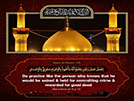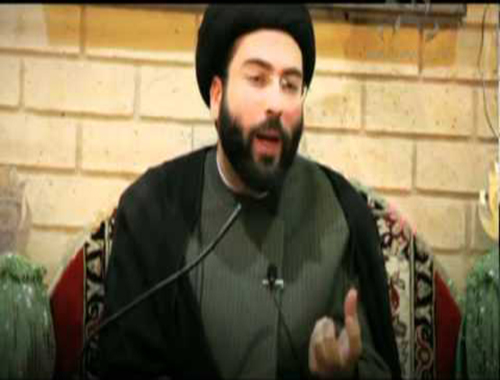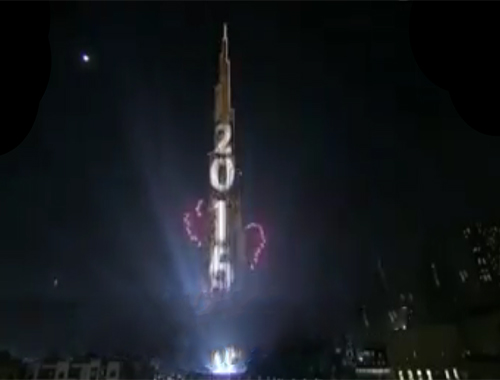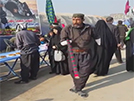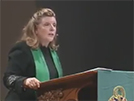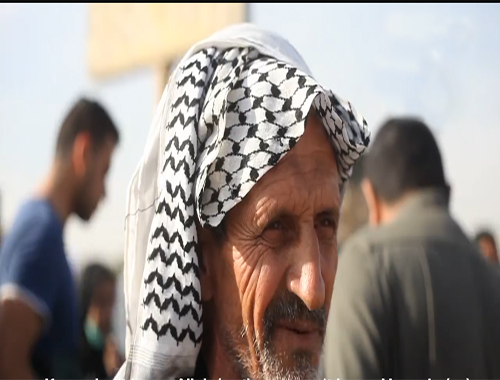Verses13-19
- Details
- Hits: 3020
Sura Infitar
(The Cleaving Asunder)
No.82 (Verses 13-19)
(13) إِنَّ الْأَبْرَارَ لَفِي نَعِيمٍ
(14) وَإِنَّ الْفُجَّارَ لَفِي جَحِيمٍ
(15) يَصْلَوْنَهَا يَوْمَ الدِّينِ
(16) وَمَا هُمْ عَنْهَا بِغَائِبِينَ
(17) وَمَا أَدْرَاكَ مَا يَوْمُ الدِّينِ
(18) ثُمَّ مَا أَدْرَاكَ مَا يَوْمُ الدِّينِ
(19) يَوْمَ لَا تَمْلِكُ نَفْسٌ لِّنَفْسٍ شَيْئًا وَالْأَمْرُ يَوْمَئِذٍ لِلَّهِ
13. Surely the Righteous shall be in Bliss,
14. And surely the Wicked shall be in blazing Fire,
15. Which they shall enter on the Day of Reckoning,
16. And never shall they be absent therefrom,
17. And what makes you know what the Day of Reckoning is?
18. Again, what makes you know what the Day of Reckoning is?
19. The Day on which no soul shall have aught for (another) soul, and the command that Day shall be (wholly) Allah's.
Commentary:
On That Day, No One Does Anything for Anyone.
Concluding the previous discussion about recording the deeds of men by the angels, the following verses speak about the account of Man on the Day of Judgement and the end of the Righteous and the Wicked. It says:
Sure1y the Righteous shall be in Bliss,
* * * *
And surely the Wicked shall be in blazing Fire.
The term /abrar/ is the plural form of /bar/ and /barr/in the sense of 'a pious person' and the term /berr/, which means any piety, here means both 'pious beliefs', 'good intentions' and 'good deeds'.
The term / na'im / is singular and means 'a good thing, a blessing' and, here, it means 'Heaven, Bliss, Eternal Gardens'. The term is mentioned in an indefinite form, in Arabic texts, to show its greatness and vastness of which no one knows, but Allah. The Arabic special grammatical form of the term, which is used here, is for emphasis and denotes to the resistance and perpetuity of this great Blessing.
The term / fujjar/ is the plural form of / fajir/ which is originally based on the term /fajr/ meaning 'to open wide' and the phrase /tulu'-i-fajr / is used for 'day-break' as if the curtain of the gloom of the dark night is torn wide open by the dawn; and the term / fujur / 'wickedness' is used for the actions of those who tear away the curtain of piety and follow the path of sin and corruption.
The term /jahim/ is derived from the term /jahm/ which means 'to light a fire',and then /jahim/ is 'a burning-fire ' which, in the Qur'an, generally means 'Hell'.
And by the Sura saying 'that the Righteous are in Bliss and the Wicked are in blazing Fire' it may mean that even now they are in Bliss and blazing fire, and in this world, too, Heavenly blessings and Hellish punishments encompass them, as Sura 'Ankabut, NO.29, verse 54 says: ...But, of a surety, Hell will encompass the rejecters of Faith.
Some scholars have said that these ideas are for an avoidable future and in Arabic literature things which are sure to happen in the future are said in present tense and sometimes the past tense of the verb is used. (The first interpretation is more appropriate with the appearance of the verse, but the second one seems better.)
The next verse further describes more about the destiny of the Wicked. It says:
Which they shall enter on the Day of Reckoning.
If the previous verse means that they are now in the blazing fire, this verse may mean that they will have more blazing fire stronger than this, on the Day of Reckoning. They will feel the perfect practicality of its heat, then.
The term /yaslaun/ is based on /saly/ which is cited with the meaning of 'entering the fire and suffering its roasting burning pain', and since in Arabic texts the verb is in the form of future tense, it denotes to continuity and being in the constant company of it.
* * * *
And, again, for more emphasis, it says:
And never shall they be absent therefrom.
Many of the commentators have considered this verse as an evidence for the continuity and eternity of the Wicked's punishment. Then they have concluded that 'the Wicked', mentioned in these verses, are 'the Unbelievers', because eternity and continuity of the fire is only for the Unbelievers. Therefore, the Wicked are those who do not care for piety, because of lack of faith in the Hereafter and rejecting the Day of Judgement, not because of the force of base desires all the while having Faith.
This verse is stated in the present tense, which is an emphasis on what was said before: that these kinds of people are not far from the blazing fire; their life, itself, is a Hell and their graves, according to some Islamic traditions, is a ditch of fire. Thus, the Hell of this world, the Hell of the partition and the Hell of the next world all are now prepared for them.
By the way, this verse depicts that the blazing fire of Hell never fades, and they will never escape it even for a moment.
* * * *
Then to illustrate the importance of that Day, it says:
And what makes you know what the Day of Reckoning is?
* * * *
Again, what makes you know what the Day of Reckoning is?
When the Prophet (p.b.u.h.), with his vast and profound knowledge about the Hereafter and the extraordinary insight he had about the Creator and the Resurrection, about the great and terrible events of that Day and its considerable horror governing there, was not well acquainted with the Hereafter, the situation of others is obvious.
This statement denotes to the fact that the horrible events of the Hereafter are so great and vast that it cannot be described with our present vocubulary. As we, the dwellers on earth, do not know well about Heaven and its abundant blessings, we cannot grasp the full concept of the punishment in Hell, and in general, of the Final Judgement, as well. The question is repeated twice to emphasize this difficulty.
* * * *
In the next verse, a simple but, complete and meaningful answer to the above question is suggested which points to one of the qualities of that Day. The answer is suggested by a negative proportion: The Day on which no soul shall have aught for (another) soul; and the command That Day shall be (wholly) Allah's. Surely, everything in this world, too, is with Allah, but, we all depend on one another in proximity, human law and institutions may hold large masses of Mankind in their grip. Here, there are, apparently, worldly rulers, owners, and powerful members with whom some superficial persons, sometimes, consider the source of independant power. But, this period will be all over. Then the ownership is totally His Own and is so perfected that their wills will be in complete consonant with Allah's Universal Will, the Absolute Command, on everything and more evident than ever, thenceforward will be wholly with Allah.
This is the same fact that is mentioned in many other verses, of the qur'an, such as Sura Mo'min, No. 40, verse 16 which says: ...Whose will be the Dominion that Day? That of Allah, the One, the Irresistible!.
As a matter of fact, everyone, on that Day, is so occupied with himself that if he had any power, he would not pay attention to anyone else; as Sura ' Abasa, No. 80, verse 37 confronts it: Each one of them, That Day, will have concern enough to occupy him.
A tradition from Imam Baqir (p.u.b.h.) says: The command that Day and today is wholly Allah's, ... but on the Day of Judgement all the rulers and owners will be removed and there will be no sovereignty except Allah's. (1)
A question may arise such as:' Does that state contrast with the intercession of prophets, saints, and angels ? '.
The answer simply is this: many verses of the Qur'an verify that intercession is also done by His leave for those who are allowed, And they offer no intercession except for those who are acceptable... (Sura Anbiya', No. 21, verse 28).
* * * *
Supplication:
O Lord! On that horrible Day, everyone hopes for your generosity and, today, we rely on you.
O Lord ! We seek your Grace in this world and the Next World: please do not deprive us.
O Lord! The absolute command is Yours: save us from polytheism and relying on others.
(1) Majma'-al-Bayan, vol. 10, p.450.
The End of Sura Infitar
(The cleaving Asunder)

